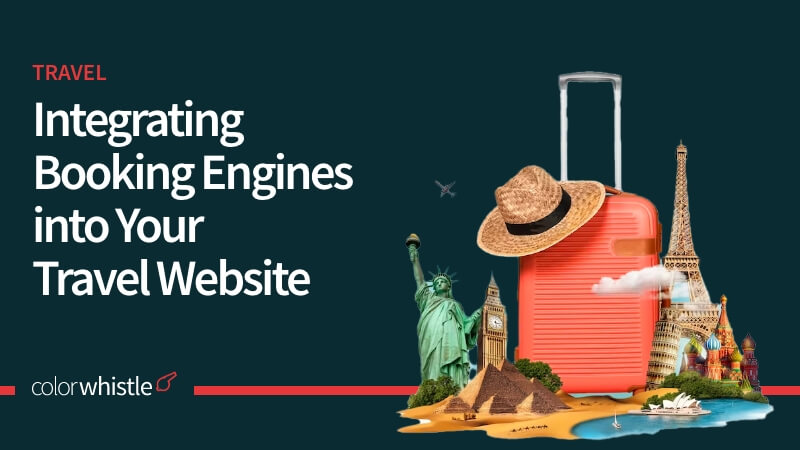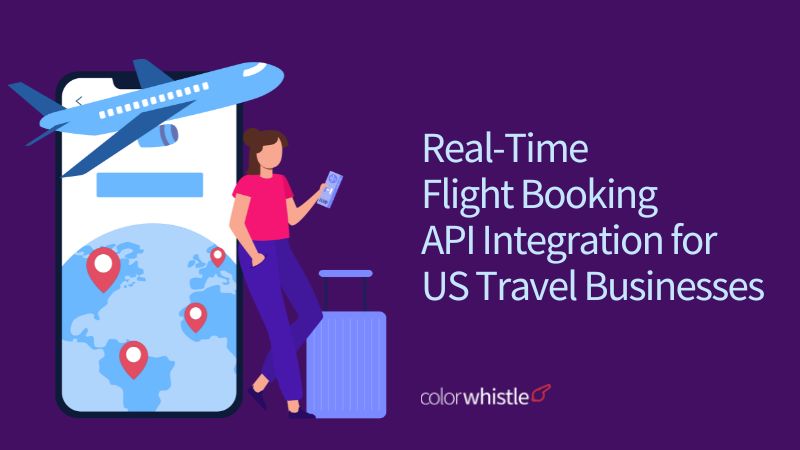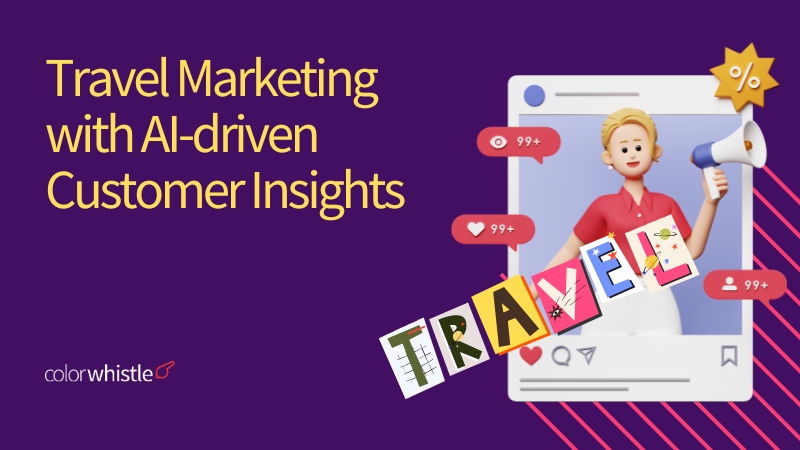Your potential customers are always pre-planning a long-awaited vacation with their families. They spend weeks researching destinations, looking for the perfect hotel, and planning exciting activities.
Finally, they are ready to make those reservations and lock in their dream getaway.
But when they stumble upon your travel website, they are bombarded with a series of steps that need to be clarified
- The dates are a bit tricky to select, and they are not quite sure if the desired is available.
- Your website lacks clear photos, detailed descriptions, and guest reviews to help them make an informed decision.
Frustration starts to creep in, but they persevere.
- Now they are asked to enter their payment information, and the page takes forever to load. They are left wondering if the booking went through or if their credit card was charged multiple times.
Hours later, still no confirmation email.
At this point, your website visitors are worried and annoyed, and their excitement for the vacation is dampened by this cumbersome booking experience.
Thus, the importance of seamless reservation processes in the travel industry cannot be overstated.
A seamless reservation process is pivotal for creating a positive user journey, building trust, and ensuring the success and growth of online travel businesses.
A seamless process ensures that you can book your flights, accommodations, tours, and everything else without a hitch.
And all this is possible with travel booking engines.
Here we have discussed some popular booking engine providers and factors to consider when selecting one for your travel website. We have also listed the technical integration process along with the latest trends in booking engine integrations.
Also Read
Definition and Type of Travel Booking Engines
A booking engine is a software tool or application that enables customers to make reservations, bookings, or appointments for various services or products directly through a website or online platform.
There are several types of booking engines, each catering to specific categories and needs:
- Flight Booking Engine
- Hotel Booking Engine
- Tours and Activities Booking Engine
- Golf Tee Time Booking Engine
- Rental Booking Engine
- Restaurant Reservation Engine
- Event Booking Engine
Flight Booking Engine: It allows users to book flights, trains, buses, or cruise ships directly through a travel website. Travel booking engines provide real-time availability, pricing, and secure payment processing.
Hotel Booking Engine: A hotel booking engine focuses specifically on accommodations. It enables users to search for available rooms, compare prices, and make reservations at hotels or other lodging establishments. These engines often integrate with property management systems to ensure accurate availability.
Tours and Activities Booking Engine: Used by tour operators and activity providers, this booking engine allows customers to browse and book various tours, excursions, and activities. It often includes features such as detailed descriptions, images, and user reviews.
Golf Tee Time Booking Engine: Golf courses use this engine to allow players to book tee times for rounds of golf. Players can choose their preferred time slots and manage their reservations.
Rental Booking Engine: Rental businesses, such as car rental companies and equipment rental shops, use this engine to manage reservations and rental agreements. Customers can book the desired items and specify rental periods.
Restaurant Reservation Engine: Restaurants use reservation engines to allow customers to book tables for dining. These engines often integrate with a restaurant’s point-of-sale system to manage reservations and seating arrangements.
Event Booking Engine: Event organizers use this type of booking engine to manage registrations and bookings for conferences, workshops, concerts, and other events. Attendees can register, choose sessions, and make payments online.
Also Read
Popular Booking Engine Providers for Travel Websites
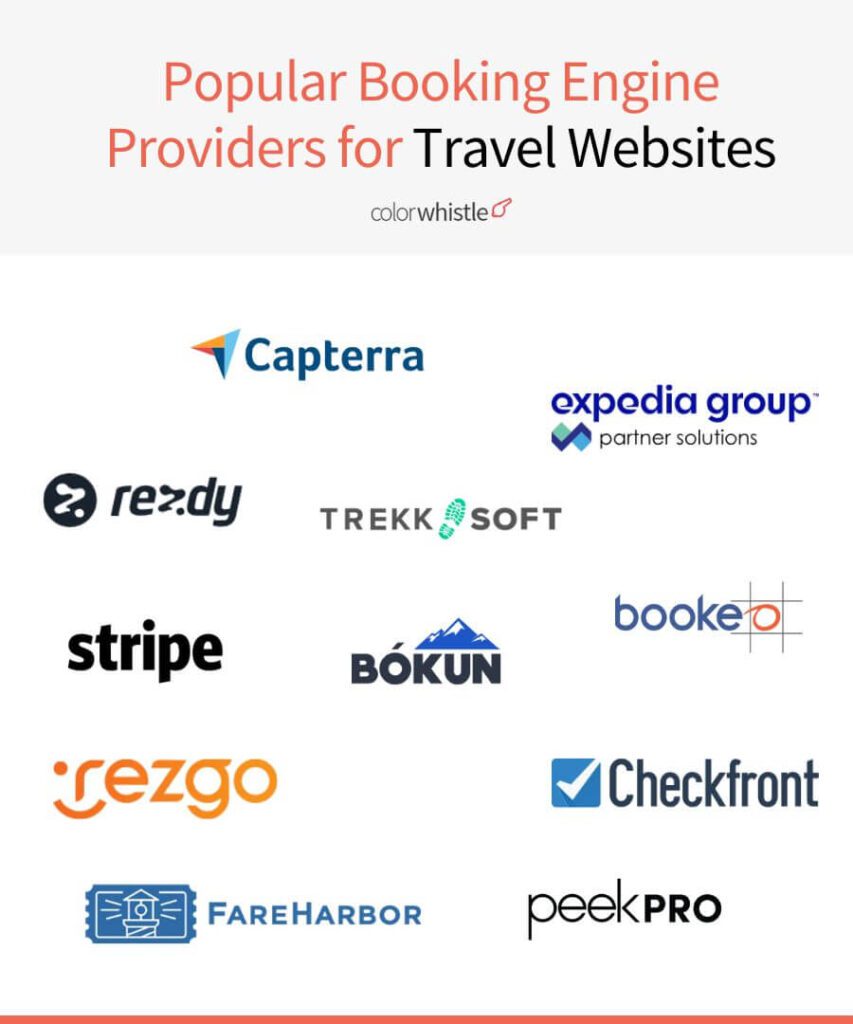
Factors to Consider When Selecting a Booking Engine For Travel Website
The right booking engine will contribute to increased conversions and the overall success of your travel website.
Take the time to evaluate your options based on the below factors and choose a solution that aligns with your business goals and user expectations.
- Type of Travel Services Offered
- Availability and Inventory Management
- Support and Documentation
- Reviews and Reputation
- User Interface and Experience
- Mobile Responsiveness and Optimization
- Scalability and Maintenance
- Cost and Pricing Model
- Payment Gateways and Security
- Integration with Your Website
- Multi-Language and Currency Support
- Reporting and Analytics
Type of Travel Services Offered:
- If your travel website offers related services including hotel accommodations, flights, car rentals, and tours, you might need a versatile booking engine to handle multiple service types.
- For instance, Expedia Partner Solutions offers a booking engine that covers various travel services under one platform
User Interface and Experience:
- The booking process should be intuitive and user-friendly.
- A well-designed interface can reduce user frustration and increase conversion rates.
- For example, Rezdy offers customizable booking solutions for tours and activities businesses, allowing them to showcase their offerings with unique descriptions, images, and pricing.
Payment Gateways and Security:
- Your users need to trust that their payment information is handled safely.
- Look for features such as SSL encryption and compliance with the Payment Card Industry Data Security Standard (PCI DSS).
- Integrate Stripe’s payment gateway into your travel website to offer secure payment options for bookings, ensuring user data protection and smooth transactions.
Availability and Inventory Management:
- The booking engine should provide real-time availability updates and inventory management.
- This prevents overbooking and ensures accurate information is displayed to users.
- Checkfront’s booking engine provides real-time availability updates, preventing overbooking and enabling users to see live information on tour and activity availability
Mobile Responsiveness and Optimization:
- With the increasing use of mobile devices, the booking engine should be responsive and optimized for various screen sizes.
- Peek Pro offers a mobile-responsive booking engine for tours and activities, ensuring a seamless and intuitive booking experience for users on smartphones and tablets.
Integration with Your Website:
- The booking engine should seamlessly integrate with your travel website – blend in with your site’s design, and not look like a separate component.
- Integration options include API-based, widget-based, and iFrame integration.
- FareHarbor offers widget-based and API integration options, allowing tours and activities businesses to seamlessly integrate booking functionality into their existing websites
Support and Documentation:
- Choose a booking engine provider that offers comprehensive documentation, tutorials, and support.
- For instance, Rezgo provides extensive documentation and responsive customer support, assisting travel businesses in successfully integrating and managing their booking processes.
Scalability and Maintenance:
- Consider the future growth of your travel business. The booking engine should be scalable to accommodate an increasing number of users and bookings without compromising performance.
- TrekkSoft’s booking engine is designed for scalability, catering to tours and activity providers of all sizes, from startups to established enterprises.
Multi-Language and Currency Support:
- If your travel website caters to an international audience, the booking engine should support multiple languages and currencies.
- Bokun offers multi-language and multi-currency support, enabling travel businesses to provide their services to a global audience with localized booking options.
Reviews and Reputation:
- Research the provider’s reputation in the industry.
- Look for user reviews and testimonials to gauge the experiences of other travel businesses that have integrated the same booking engine.
- Go to the Capterra and use the search bar to look for travel booking engines or related keywords.
Cost and Pricing Model:
- Some providers charge based on transactions, while others offer a subscription model.
- Consider the cost implications and how they align with your business’s budget.
- Bookeo offers flexible pricing plans for appointments, classes, and tours, allowing businesses to choose a plan that aligns with their booking needs.
Reporting and Analytics:
- The booking engine should provide reporting and analytics features.
- This helps you track booking trends, user behavior, and conversion rates, allowing you to make data-driven decisions for optimization.
- FareHarbor’s booking engine is the best in providing businesses to track bookings, user behavior, and performance for optimization.
Technical Integration Steps of Travel Booking Engines
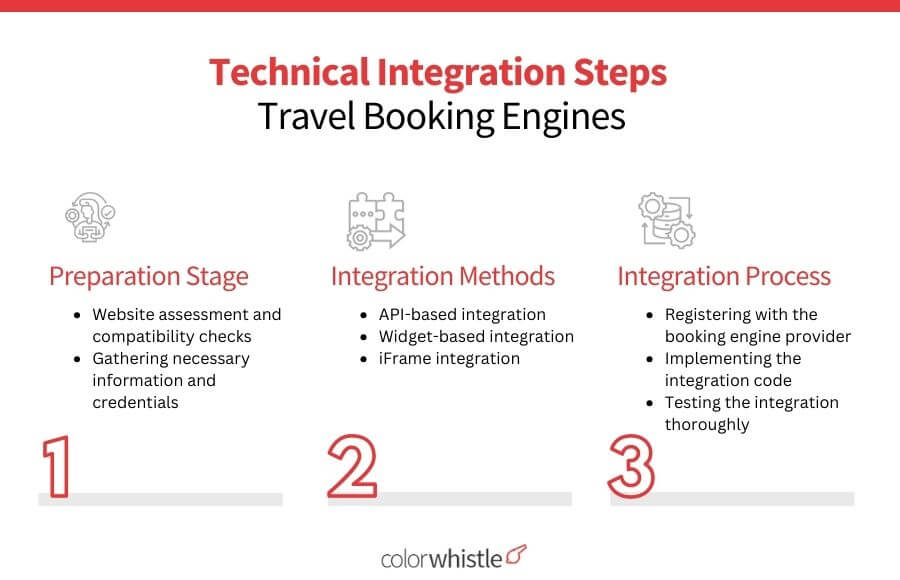
Preparation Stage
- Environment Setup: Set up a development environment for testing and integration. This ensures that your changes and modifications won’t affect the live website until everything is thoroughly tested.
- Data Mapping: Map your website’s data fields (such as room types, pricing, and availability) to the corresponding fields in the booking engine’s API. This ensures data consistency during integration.
Integration Methods
- API-based Integration, Widget-based Integration, and iFrame Integration are three distinct methods of incorporating external functionality into a website.
- The choice of integration method depends on factors such as your technical capabilities, customization needs, and the level of control you want over the integrated content.
Let’s briefly highlight these methods:
API-based Application Programming Interface) Integration: Offers high customization and real-time data exchange but requires coding expertise.
Widget-based Integration: Provides quick integration without extensive coding but has limited customization options.
iFrame (Inline Frame) Integration: Simple to implement but offers less control over the appearance and behavior of external content.
Implementing Code
- Develop Integration Code: Write the necessary code to connect your website with the booking engine’s API. This involves sending and receiving data like search queries, booking requests, and availability updates.
- Implement Search Functionality: Integrate the booking engine’s search functionality into your website. Users should be able to search for flights, hotels, or activities directly from your site.
- Real-Time Availability Updates: Implement code that allows your website to pull real-time availability data from the booking engine. Users should see accurate and up-to-date information.
- User Interface Integration: Design and integrate user interfaces for displaying search results, pricing, and booking options. Ensure a seamless and intuitive user experience.
- Booking Process Flow: Develop the flow for the booking process. Users should be able to select options, provide personal details, review booking summaries, and make payments seamlessly.
- Secure Payment Integration: Integrate secure payment gateways to handle online transactions. Ensure that sensitive payment information is handled securely and that payment data is encrypted.
- Confirmation and Notifications: Implement a system to generate booking confirmations and notifications. Users should receive instant confirmation emails with all relevant details.
Also Read
Testing
Thoroughly test the integration in a staging environment. Test different scenarios, such as successful bookings, failed bookings, and edge cases.
In addition to that,
- Performance Optimization: Optimize the integration for speed and efficiency. Slow response times can lead to user frustration and abandoned bookings.
- User Acceptance Testing: Invite a group of users to test the integrated booking process. Gather feedback and make necessary adjustments based on their experiences.
- Documentation and Training: Prepare documentation for your team on how to manage and troubleshoot the integrated booking system. Provide training if needed.
- Deployment: Once testing is successful, deploy the integrated booking engine to your live website. Monitor the system closely during the initial stages to address any unforeseen issues.
Latest Trends in Booking Engine Integration on Travel Website
- Personalization and AI
- Blockchain for Security
- Omni-channel Customer Support
- Voice Search Integration
- Augmented Reality (AR) and Virtual Reality (VR)
- Sustainability and Eco-Friendly Options
Booking engine integration is constantly evolving to meet the changing needs and preferences of users and businesses. Incorporating the following trends into booking engine integration strategies can help businesses stay competitive, enhance user experience, and adapt to the changing landscape of the online booking industry.
- Personalization and AI: AI can analyze user behavior, preferences, and past bookings to suggest tailored options, enhancing user satisfaction.
- Voice Search Integration: This trend caters to the growing number of users who prefer hands-free interactions and make reservations using voice commands
- Blockchain for Security: Integrating blockchain into booking engines can enhance data privacy, prevent fraud, and build trust among users and businesses.
- Augmented Reality (AR) and Virtual Reality (VR): Travelers can virtually explore hotel rooms or experience tours and activities, helping them make more informed decisions.
- Omni-channel Customer Support: Integrating conversational AI can provide human-like, intelligent & dynamic assistance to users during the booking process and post-booking support.
This one has to be unique!
- Sustainability and Eco-Friendly Options: Many travelers are now conscious of their environmental impact. Integrating eco-friendly options into booking engines, such as carbon offset choices or sustainable accommodations, aligns with this trend.
Also Read
Choose Your Travel Technology Partner For Integrations
Depending on your technical expertise and the scope of your project, you might consider working with a team of developers, designers, and other specialists to ensure a successful and user-friendly booking engine integration.
Feel free to connect with ColorWhistle for any booking engine integration and travel website solutions with competitive pricing options. We are available at +1 (210) 787-3600 anytime to answer all of your business queries.
What’s Next?
Now that you’ve had the chance to explore our blog, it’s time to take the next step and see what opportunities await!

